A Critical Analysis: Globalization and its Impact on Sovereignty
VerifiedAdded on 2023/04/04
|13
|3347
|225
Essay
AI Summary
This essay examines the multifaceted impact of globalization on the sovereignty of nation-states, noting its effects on economy, politics, society, and technology. It addresses criticisms that globalization, while enabling business expansion, challenges the internal politics and governance of states. The essay discusses how the interchange of goods, ideas, and information transforms the global system, influencing human lives and creating dependencies on global institutions like NATO, EU, IMF, and the World Bank. It further explores whether state sovereignty is diminishing or transforming, considering hyper-globalist views and transformationalist perspectives. The analysis includes the role of international trends, human rights, and the complexities of global problems, ultimately questioning the traditional concept of sovereignty in the face of increasing transnational activities and economic interdependence. The essay also highlights historical contexts and the varying capacities of states, suggesting that factors beyond globalization, such as political systems and governmental efficiency, significantly influence sovereignty. Desklib provides study tools and resources for students.
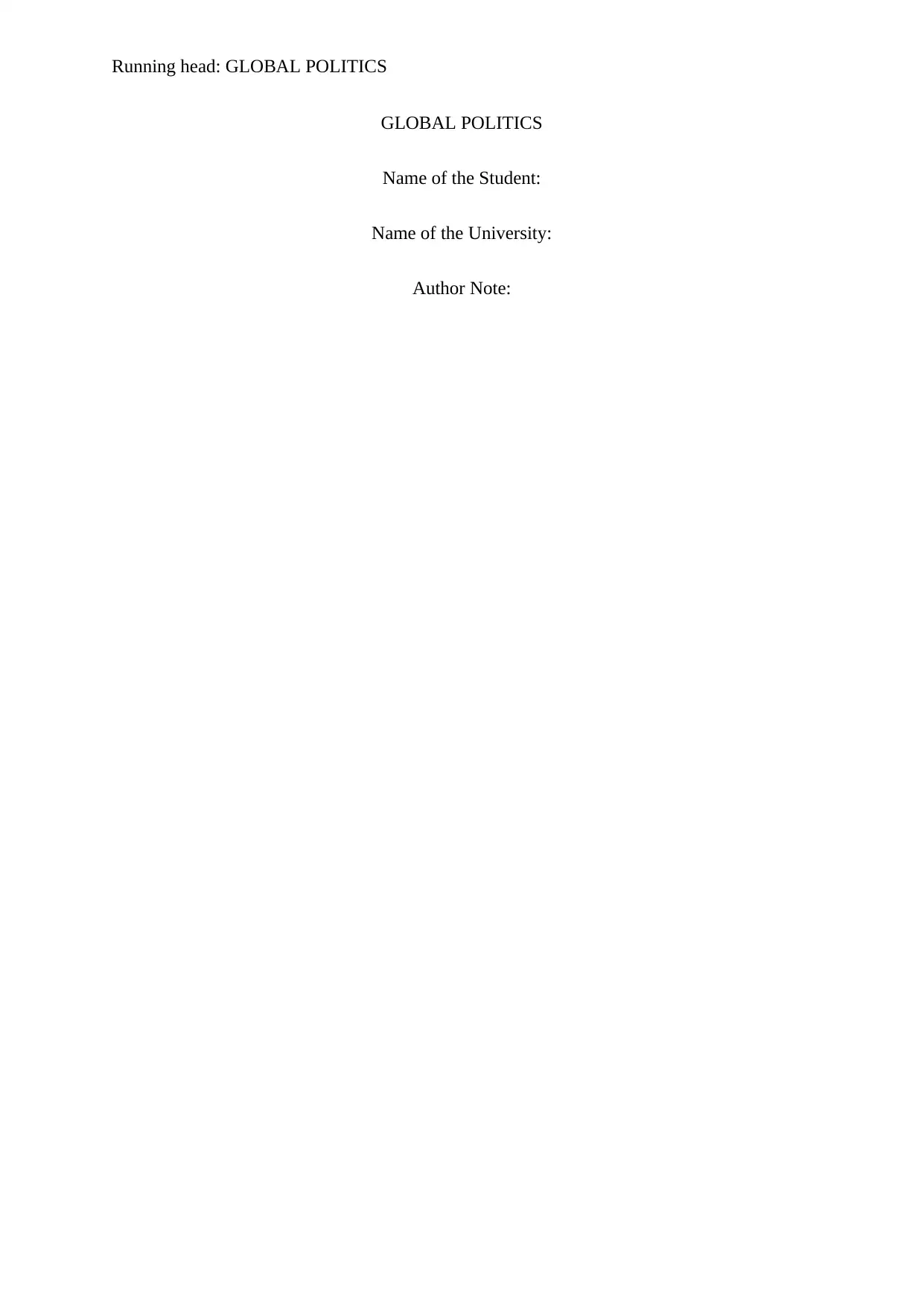
Running head: GLOBAL POLITICS
GLOBAL POLITICS
Name of the Student:
Name of the University:
Author Note:
GLOBAL POLITICS
Name of the Student:
Name of the University:
Author Note:
Paraphrase This Document
Need a fresh take? Get an instant paraphrase of this document with our AI Paraphraser
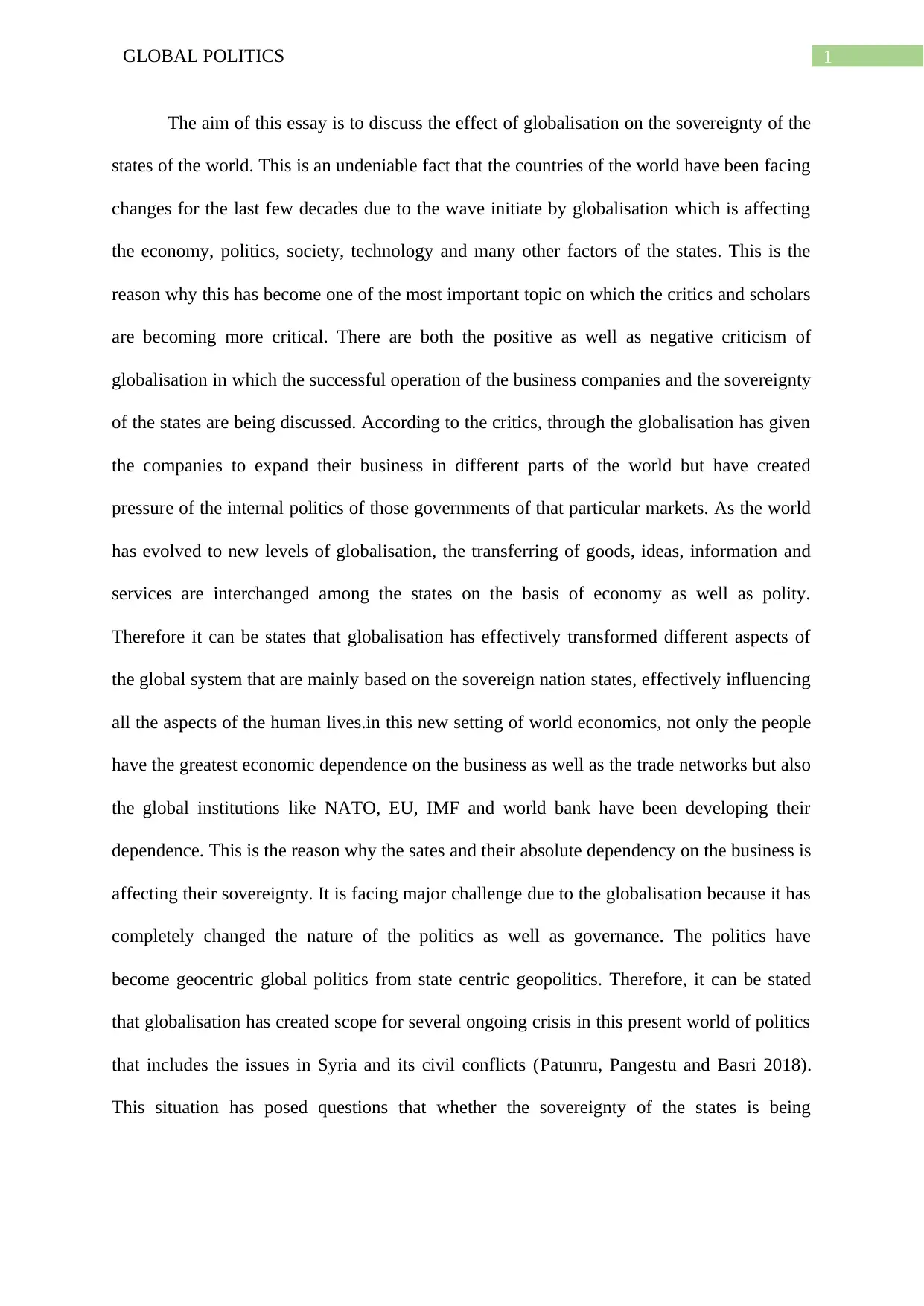
1GLOBAL POLITICS
The aim of this essay is to discuss the effect of globalisation on the sovereignty of the
states of the world. This is an undeniable fact that the countries of the world have been facing
changes for the last few decades due to the wave initiate by globalisation which is affecting
the economy, politics, society, technology and many other factors of the states. This is the
reason why this has become one of the most important topic on which the critics and scholars
are becoming more critical. There are both the positive as well as negative criticism of
globalisation in which the successful operation of the business companies and the sovereignty
of the states are being discussed. According to the critics, through the globalisation has given
the companies to expand their business in different parts of the world but have created
pressure of the internal politics of those governments of that particular markets. As the world
has evolved to new levels of globalisation, the transferring of goods, ideas, information and
services are interchanged among the states on the basis of economy as well as polity.
Therefore it can be states that globalisation has effectively transformed different aspects of
the global system that are mainly based on the sovereign nation states, effectively influencing
all the aspects of the human lives.in this new setting of world economics, not only the people
have the greatest economic dependence on the business as well as the trade networks but also
the global institutions like NATO, EU, IMF and world bank have been developing their
dependence. This is the reason why the sates and their absolute dependency on the business is
affecting their sovereignty. It is facing major challenge due to the globalisation because it has
completely changed the nature of the politics as well as governance. The politics have
become geocentric global politics from state centric geopolitics. Therefore, it can be stated
that globalisation has created scope for several ongoing crisis in this present world of politics
that includes the issues in Syria and its civil conflicts (Patunru, Pangestu and Basri 2018).
This situation has posed questions that whether the sovereignty of the states is being
The aim of this essay is to discuss the effect of globalisation on the sovereignty of the
states of the world. This is an undeniable fact that the countries of the world have been facing
changes for the last few decades due to the wave initiate by globalisation which is affecting
the economy, politics, society, technology and many other factors of the states. This is the
reason why this has become one of the most important topic on which the critics and scholars
are becoming more critical. There are both the positive as well as negative criticism of
globalisation in which the successful operation of the business companies and the sovereignty
of the states are being discussed. According to the critics, through the globalisation has given
the companies to expand their business in different parts of the world but have created
pressure of the internal politics of those governments of that particular markets. As the world
has evolved to new levels of globalisation, the transferring of goods, ideas, information and
services are interchanged among the states on the basis of economy as well as polity.
Therefore it can be states that globalisation has effectively transformed different aspects of
the global system that are mainly based on the sovereign nation states, effectively influencing
all the aspects of the human lives.in this new setting of world economics, not only the people
have the greatest economic dependence on the business as well as the trade networks but also
the global institutions like NATO, EU, IMF and world bank have been developing their
dependence. This is the reason why the sates and their absolute dependency on the business is
affecting their sovereignty. It is facing major challenge due to the globalisation because it has
completely changed the nature of the politics as well as governance. The politics have
become geocentric global politics from state centric geopolitics. Therefore, it can be stated
that globalisation has created scope for several ongoing crisis in this present world of politics
that includes the issues in Syria and its civil conflicts (Patunru, Pangestu and Basri 2018).
This situation has posed questions that whether the sovereignty of the states is being
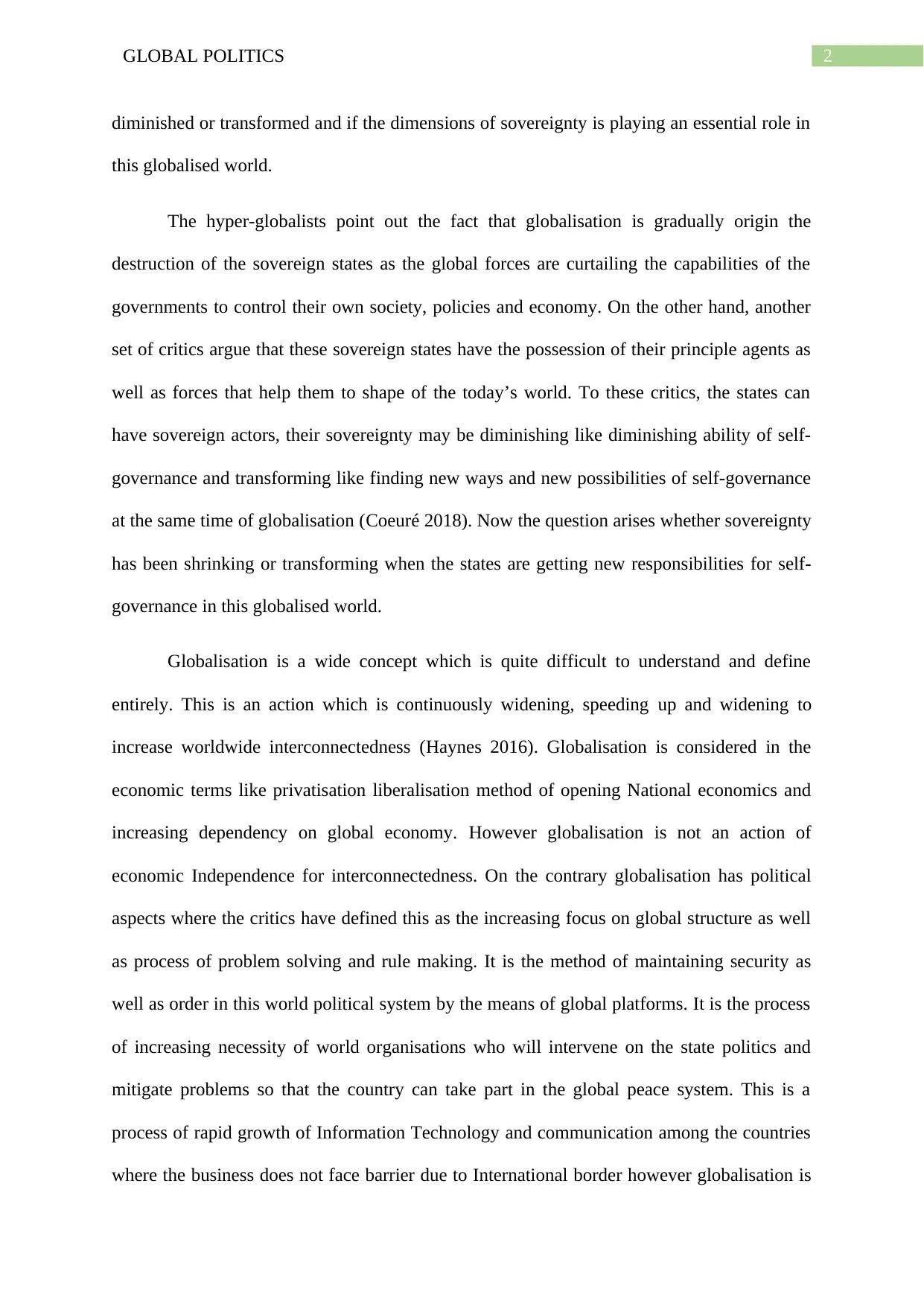
2GLOBAL POLITICS
diminished or transformed and if the dimensions of sovereignty is playing an essential role in
this globalised world.
The hyper-globalists point out the fact that globalisation is gradually origin the
destruction of the sovereign states as the global forces are curtailing the capabilities of the
governments to control their own society, policies and economy. On the other hand, another
set of critics argue that these sovereign states have the possession of their principle agents as
well as forces that help them to shape of the today’s world. To these critics, the states can
have sovereign actors, their sovereignty may be diminishing like diminishing ability of self-
governance and transforming like finding new ways and new possibilities of self-governance
at the same time of globalisation (Coeuré 2018). Now the question arises whether sovereignty
has been shrinking or transforming when the states are getting new responsibilities for self-
governance in this globalised world.
Globalisation is a wide concept which is quite difficult to understand and define
entirely. This is an action which is continuously widening, speeding up and widening to
increase worldwide interconnectedness (Haynes 2016). Globalisation is considered in the
economic terms like privatisation liberalisation method of opening National economics and
increasing dependency on global economy. However globalisation is not an action of
economic Independence for interconnectedness. On the contrary globalisation has political
aspects where the critics have defined this as the increasing focus on global structure as well
as process of problem solving and rule making. It is the method of maintaining security as
well as order in this world political system by the means of global platforms. It is the process
of increasing necessity of world organisations who will intervene on the state politics and
mitigate problems so that the country can take part in the global peace system. This is a
process of rapid growth of Information Technology and communication among the countries
where the business does not face barrier due to International border however globalisation is
diminished or transformed and if the dimensions of sovereignty is playing an essential role in
this globalised world.
The hyper-globalists point out the fact that globalisation is gradually origin the
destruction of the sovereign states as the global forces are curtailing the capabilities of the
governments to control their own society, policies and economy. On the other hand, another
set of critics argue that these sovereign states have the possession of their principle agents as
well as forces that help them to shape of the today’s world. To these critics, the states can
have sovereign actors, their sovereignty may be diminishing like diminishing ability of self-
governance and transforming like finding new ways and new possibilities of self-governance
at the same time of globalisation (Coeuré 2018). Now the question arises whether sovereignty
has been shrinking or transforming when the states are getting new responsibilities for self-
governance in this globalised world.
Globalisation is a wide concept which is quite difficult to understand and define
entirely. This is an action which is continuously widening, speeding up and widening to
increase worldwide interconnectedness (Haynes 2016). Globalisation is considered in the
economic terms like privatisation liberalisation method of opening National economics and
increasing dependency on global economy. However globalisation is not an action of
economic Independence for interconnectedness. On the contrary globalisation has political
aspects where the critics have defined this as the increasing focus on global structure as well
as process of problem solving and rule making. It is the method of maintaining security as
well as order in this world political system by the means of global platforms. It is the process
of increasing necessity of world organisations who will intervene on the state politics and
mitigate problems so that the country can take part in the global peace system. This is a
process of rapid growth of Information Technology and communication among the countries
where the business does not face barrier due to International border however globalisation is
⊘ This is a preview!⊘
Do you want full access?
Subscribe today to unlock all pages.

Trusted by 1+ million students worldwide
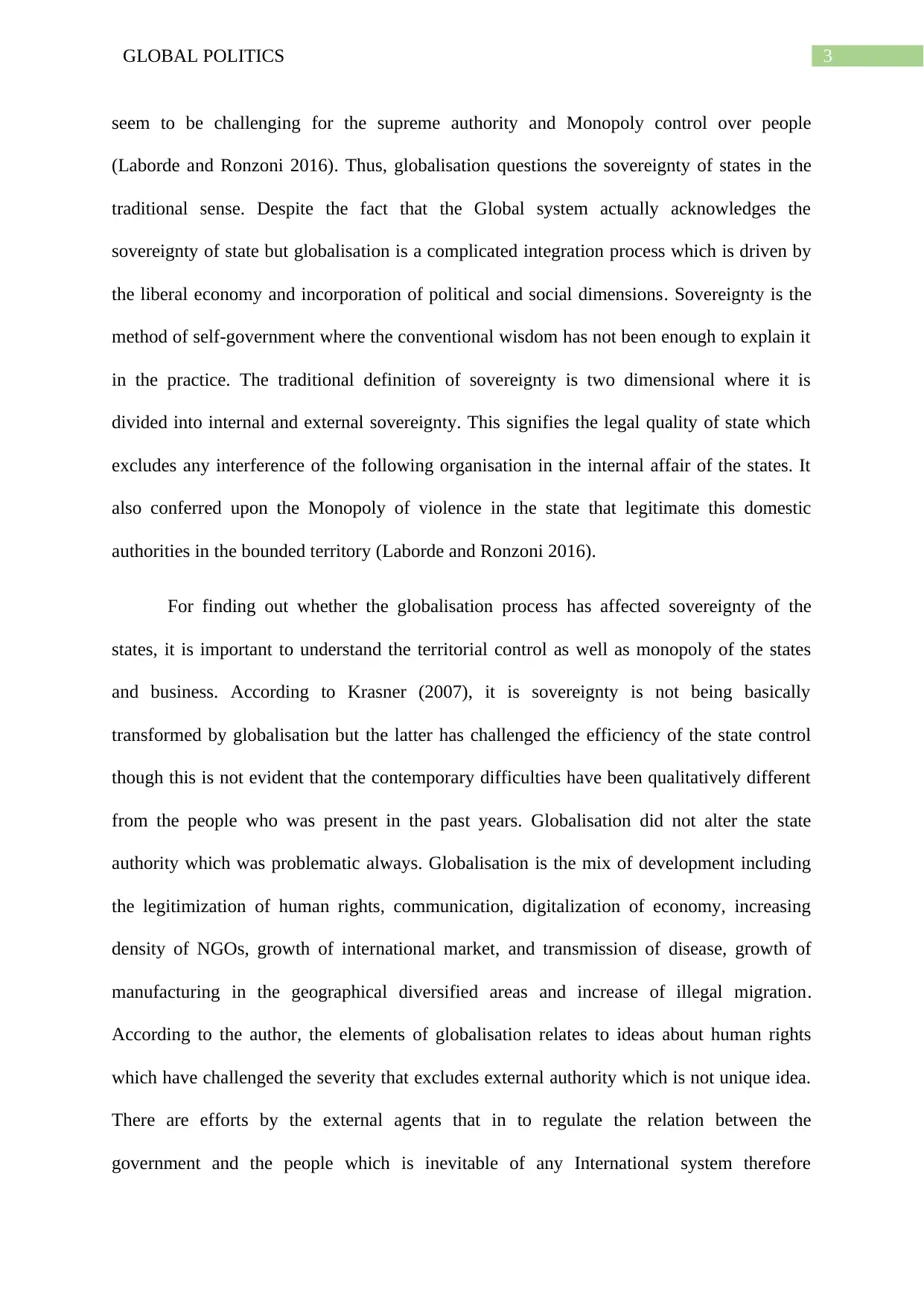
3GLOBAL POLITICS
seem to be challenging for the supreme authority and Monopoly control over people
(Laborde and Ronzoni 2016). Thus, globalisation questions the sovereignty of states in the
traditional sense. Despite the fact that the Global system actually acknowledges the
sovereignty of state but globalisation is a complicated integration process which is driven by
the liberal economy and incorporation of political and social dimensions. Sovereignty is the
method of self-government where the conventional wisdom has not been enough to explain it
in the practice. The traditional definition of sovereignty is two dimensional where it is
divided into internal and external sovereignty. This signifies the legal quality of state which
excludes any interference of the following organisation in the internal affair of the states. It
also conferred upon the Monopoly of violence in the state that legitimate this domestic
authorities in the bounded territory (Laborde and Ronzoni 2016).
For finding out whether the globalisation process has affected sovereignty of the
states, it is important to understand the territorial control as well as monopoly of the states
and business. According to Krasner (2007), it is sovereignty is not being basically
transformed by globalisation but the latter has challenged the efficiency of the state control
though this is not evident that the contemporary difficulties have been qualitatively different
from the people who was present in the past years. Globalisation did not alter the state
authority which was problematic always. Globalisation is the mix of development including
the legitimization of human rights, communication, digitalization of economy, increasing
density of NGOs, growth of international market, and transmission of disease, growth of
manufacturing in the geographical diversified areas and increase of illegal migration.
According to the author, the elements of globalisation relates to ideas about human rights
which have challenged the severity that excludes external authority which is not unique idea.
There are efforts by the external agents that in to regulate the relation between the
government and the people which is inevitable of any International system therefore
seem to be challenging for the supreme authority and Monopoly control over people
(Laborde and Ronzoni 2016). Thus, globalisation questions the sovereignty of states in the
traditional sense. Despite the fact that the Global system actually acknowledges the
sovereignty of state but globalisation is a complicated integration process which is driven by
the liberal economy and incorporation of political and social dimensions. Sovereignty is the
method of self-government where the conventional wisdom has not been enough to explain it
in the practice. The traditional definition of sovereignty is two dimensional where it is
divided into internal and external sovereignty. This signifies the legal quality of state which
excludes any interference of the following organisation in the internal affair of the states. It
also conferred upon the Monopoly of violence in the state that legitimate this domestic
authorities in the bounded territory (Laborde and Ronzoni 2016).
For finding out whether the globalisation process has affected sovereignty of the
states, it is important to understand the territorial control as well as monopoly of the states
and business. According to Krasner (2007), it is sovereignty is not being basically
transformed by globalisation but the latter has challenged the efficiency of the state control
though this is not evident that the contemporary difficulties have been qualitatively different
from the people who was present in the past years. Globalisation did not alter the state
authority which was problematic always. Globalisation is the mix of development including
the legitimization of human rights, communication, digitalization of economy, increasing
density of NGOs, growth of international market, and transmission of disease, growth of
manufacturing in the geographical diversified areas and increase of illegal migration.
According to the author, the elements of globalisation relates to ideas about human rights
which have challenged the severity that excludes external authority which is not unique idea.
There are efforts by the external agents that in to regulate the relation between the
government and the people which is inevitable of any International system therefore
Paraphrase This Document
Need a fresh take? Get an instant paraphrase of this document with our AI Paraphraser
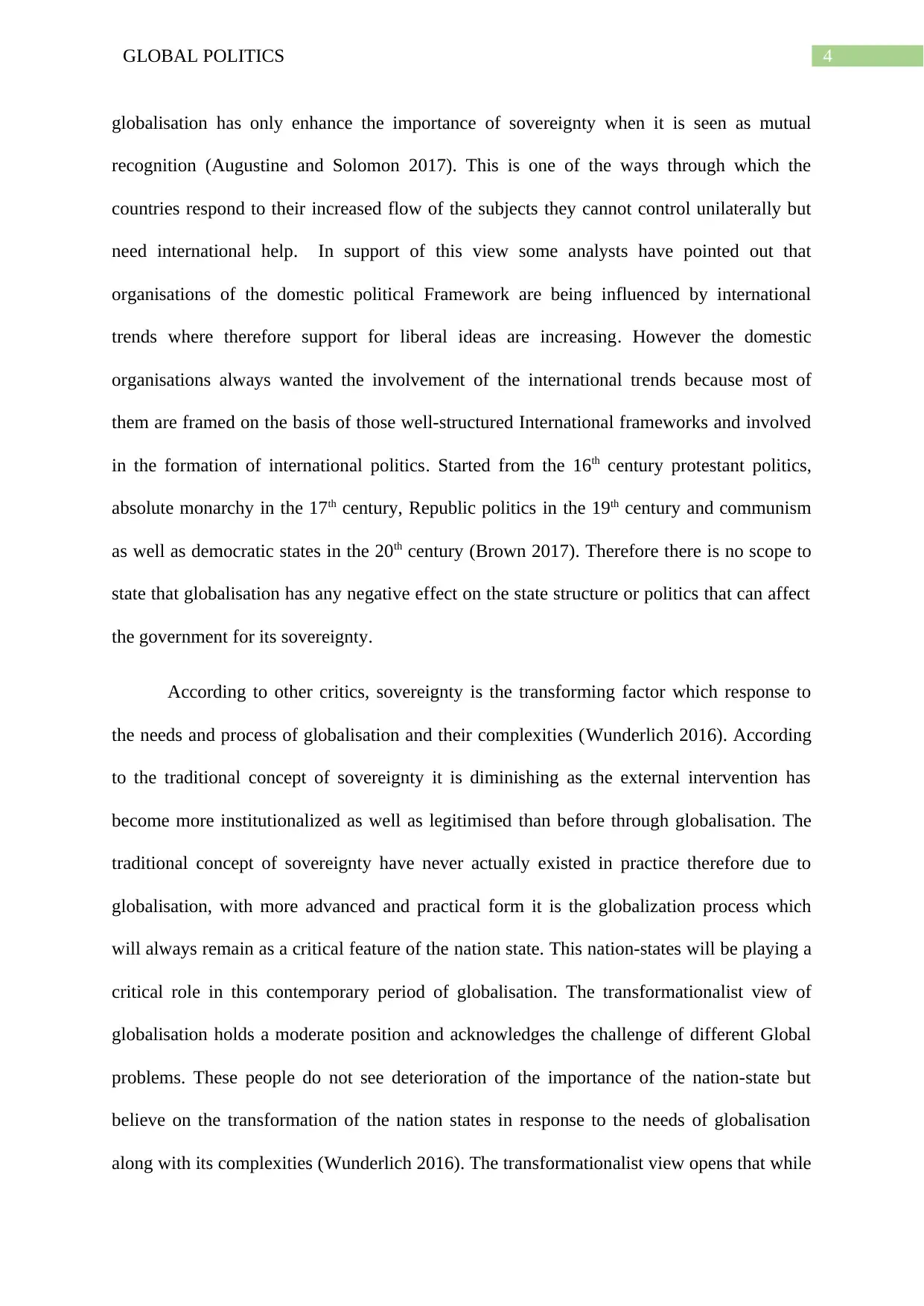
4GLOBAL POLITICS
globalisation has only enhance the importance of sovereignty when it is seen as mutual
recognition (Augustine and Solomon 2017). This is one of the ways through which the
countries respond to their increased flow of the subjects they cannot control unilaterally but
need international help. In support of this view some analysts have pointed out that
organisations of the domestic political Framework are being influenced by international
trends where therefore support for liberal ideas are increasing. However the domestic
organisations always wanted the involvement of the international trends because most of
them are framed on the basis of those well-structured International frameworks and involved
in the formation of international politics. Started from the 16th century protestant politics,
absolute monarchy in the 17th century, Republic politics in the 19th century and communism
as well as democratic states in the 20th century (Brown 2017). Therefore there is no scope to
state that globalisation has any negative effect on the state structure or politics that can affect
the government for its sovereignty.
According to other critics, sovereignty is the transforming factor which response to
the needs and process of globalisation and their complexities (Wunderlich 2016). According
to the traditional concept of sovereignty it is diminishing as the external intervention has
become more institutionalized as well as legitimised than before through globalisation. The
traditional concept of sovereignty have never actually existed in practice therefore due to
globalisation, with more advanced and practical form it is the globalization process which
will always remain as a critical feature of the nation state. This nation-states will be playing a
critical role in this contemporary period of globalisation. The transformationalist view of
globalisation holds a moderate position and acknowledges the challenge of different Global
problems. These people do not see deterioration of the importance of the nation-state but
believe on the transformation of the nation states in response to the needs of globalisation
along with its complexities (Wunderlich 2016). The transformationalist view opens that while
globalisation has only enhance the importance of sovereignty when it is seen as mutual
recognition (Augustine and Solomon 2017). This is one of the ways through which the
countries respond to their increased flow of the subjects they cannot control unilaterally but
need international help. In support of this view some analysts have pointed out that
organisations of the domestic political Framework are being influenced by international
trends where therefore support for liberal ideas are increasing. However the domestic
organisations always wanted the involvement of the international trends because most of
them are framed on the basis of those well-structured International frameworks and involved
in the formation of international politics. Started from the 16th century protestant politics,
absolute monarchy in the 17th century, Republic politics in the 19th century and communism
as well as democratic states in the 20th century (Brown 2017). Therefore there is no scope to
state that globalisation has any negative effect on the state structure or politics that can affect
the government for its sovereignty.
According to other critics, sovereignty is the transforming factor which response to
the needs and process of globalisation and their complexities (Wunderlich 2016). According
to the traditional concept of sovereignty it is diminishing as the external intervention has
become more institutionalized as well as legitimised than before through globalisation. The
traditional concept of sovereignty have never actually existed in practice therefore due to
globalisation, with more advanced and practical form it is the globalization process which
will always remain as a critical feature of the nation state. This nation-states will be playing a
critical role in this contemporary period of globalisation. The transformationalist view of
globalisation holds a moderate position and acknowledges the challenge of different Global
problems. These people do not see deterioration of the importance of the nation-state but
believe on the transformation of the nation states in response to the needs of globalisation
along with its complexities (Wunderlich 2016). The transformationalist view opens that while
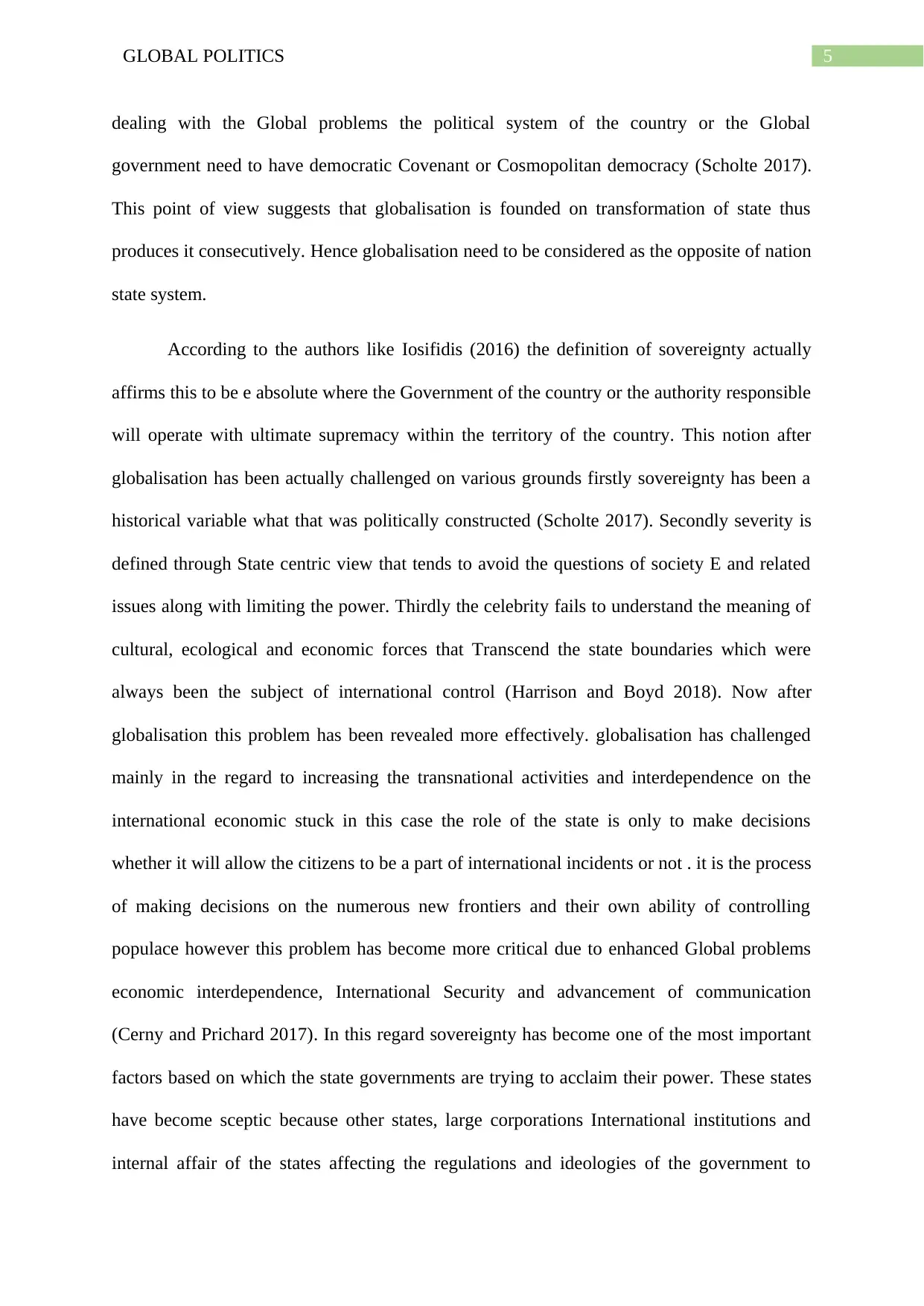
5GLOBAL POLITICS
dealing with the Global problems the political system of the country or the Global
government need to have democratic Covenant or Cosmopolitan democracy (Scholte 2017).
This point of view suggests that globalisation is founded on transformation of state thus
produces it consecutively. Hence globalisation need to be considered as the opposite of nation
state system.
According to the authors like Iosifidis (2016) the definition of sovereignty actually
affirms this to be e absolute where the Government of the country or the authority responsible
will operate with ultimate supremacy within the territory of the country. This notion after
globalisation has been actually challenged on various grounds firstly sovereignty has been a
historical variable what that was politically constructed (Scholte 2017). Secondly severity is
defined through State centric view that tends to avoid the questions of society E and related
issues along with limiting the power. Thirdly the celebrity fails to understand the meaning of
cultural, ecological and economic forces that Transcend the state boundaries which were
always been the subject of international control (Harrison and Boyd 2018). Now after
globalisation this problem has been revealed more effectively. globalisation has challenged
mainly in the regard to increasing the transnational activities and interdependence on the
international economic stuck in this case the role of the state is only to make decisions
whether it will allow the citizens to be a part of international incidents or not . it is the process
of making decisions on the numerous new frontiers and their own ability of controlling
populace however this problem has become more critical due to enhanced Global problems
economic interdependence, International Security and advancement of communication
(Cerny and Prichard 2017). In this regard sovereignty has become one of the most important
factors based on which the state governments are trying to acclaim their power. These states
have become sceptic because other states, large corporations International institutions and
internal affair of the states affecting the regulations and ideologies of the government to
dealing with the Global problems the political system of the country or the Global
government need to have democratic Covenant or Cosmopolitan democracy (Scholte 2017).
This point of view suggests that globalisation is founded on transformation of state thus
produces it consecutively. Hence globalisation need to be considered as the opposite of nation
state system.
According to the authors like Iosifidis (2016) the definition of sovereignty actually
affirms this to be e absolute where the Government of the country or the authority responsible
will operate with ultimate supremacy within the territory of the country. This notion after
globalisation has been actually challenged on various grounds firstly sovereignty has been a
historical variable what that was politically constructed (Scholte 2017). Secondly severity is
defined through State centric view that tends to avoid the questions of society E and related
issues along with limiting the power. Thirdly the celebrity fails to understand the meaning of
cultural, ecological and economic forces that Transcend the state boundaries which were
always been the subject of international control (Harrison and Boyd 2018). Now after
globalisation this problem has been revealed more effectively. globalisation has challenged
mainly in the regard to increasing the transnational activities and interdependence on the
international economic stuck in this case the role of the state is only to make decisions
whether it will allow the citizens to be a part of international incidents or not . it is the process
of making decisions on the numerous new frontiers and their own ability of controlling
populace however this problem has become more critical due to enhanced Global problems
economic interdependence, International Security and advancement of communication
(Cerny and Prichard 2017). In this regard sovereignty has become one of the most important
factors based on which the state governments are trying to acclaim their power. These states
have become sceptic because other states, large corporations International institutions and
internal affair of the states affecting the regulations and ideologies of the government to
⊘ This is a preview!⊘
Do you want full access?
Subscribe today to unlock all pages.

Trusted by 1+ million students worldwide
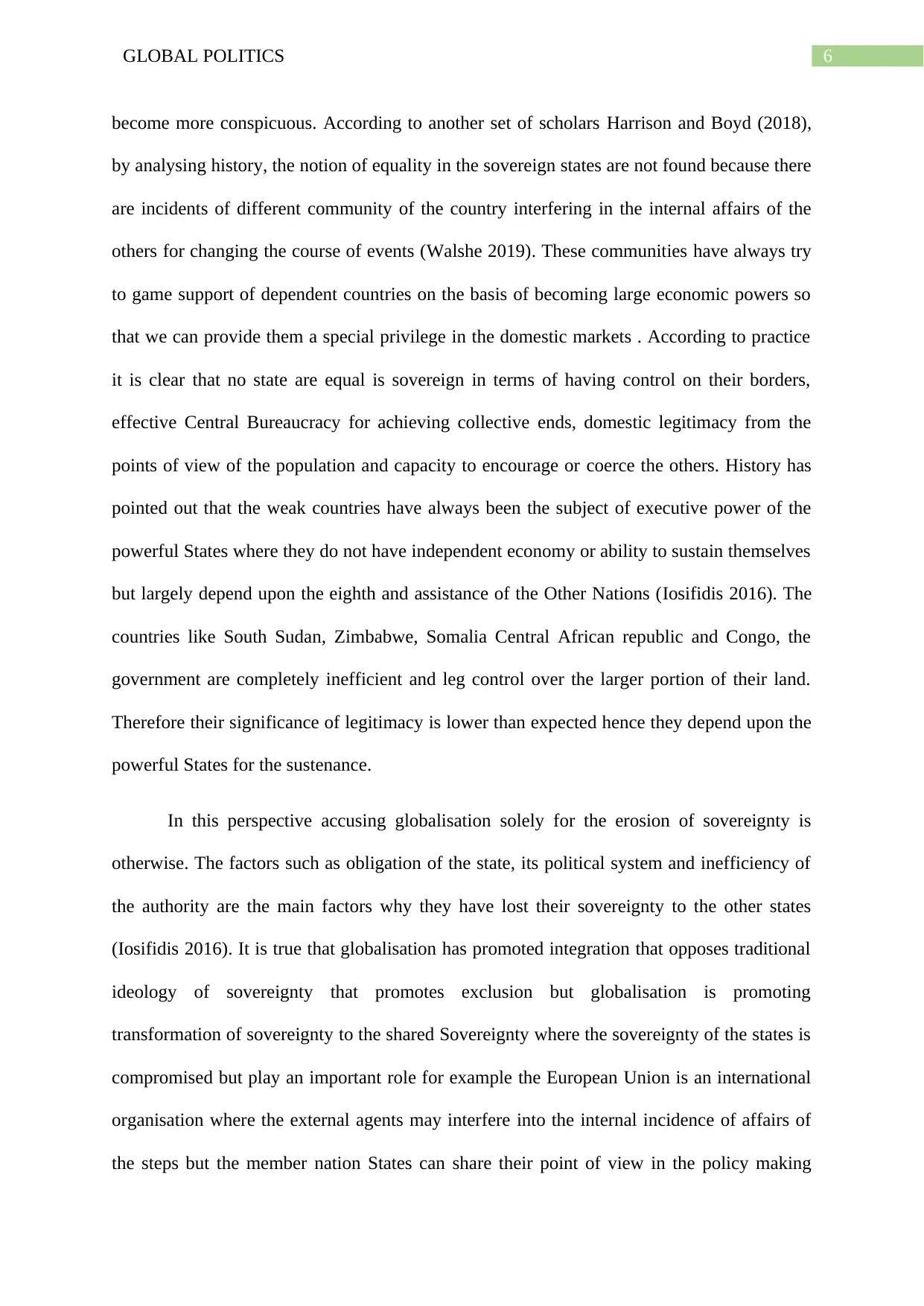
6GLOBAL POLITICS
become more conspicuous. According to another set of scholars Harrison and Boyd (2018),
by analysing history, the notion of equality in the sovereign states are not found because there
are incidents of different community of the country interfering in the internal affairs of the
others for changing the course of events (Walshe 2019). These communities have always try
to game support of dependent countries on the basis of becoming large economic powers so
that we can provide them a special privilege in the domestic markets . According to practice
it is clear that no state are equal is sovereign in terms of having control on their borders,
effective Central Bureaucracy for achieving collective ends, domestic legitimacy from the
points of view of the population and capacity to encourage or coerce the others. History has
pointed out that the weak countries have always been the subject of executive power of the
powerful States where they do not have independent economy or ability to sustain themselves
but largely depend upon the eighth and assistance of the Other Nations (Iosifidis 2016). The
countries like South Sudan, Zimbabwe, Somalia Central African republic and Congo, the
government are completely inefficient and leg control over the larger portion of their land.
Therefore their significance of legitimacy is lower than expected hence they depend upon the
powerful States for the sustenance.
In this perspective accusing globalisation solely for the erosion of sovereignty is
otherwise. The factors such as obligation of the state, its political system and inefficiency of
the authority are the main factors why they have lost their sovereignty to the other states
(Iosifidis 2016). It is true that globalisation has promoted integration that opposes traditional
ideology of sovereignty that promotes exclusion but globalisation is promoting
transformation of sovereignty to the shared Sovereignty where the sovereignty of the states is
compromised but play an important role for example the European Union is an international
organisation where the external agents may interfere into the internal incidence of affairs of
the steps but the member nation States can share their point of view in the policy making
become more conspicuous. According to another set of scholars Harrison and Boyd (2018),
by analysing history, the notion of equality in the sovereign states are not found because there
are incidents of different community of the country interfering in the internal affairs of the
others for changing the course of events (Walshe 2019). These communities have always try
to game support of dependent countries on the basis of becoming large economic powers so
that we can provide them a special privilege in the domestic markets . According to practice
it is clear that no state are equal is sovereign in terms of having control on their borders,
effective Central Bureaucracy for achieving collective ends, domestic legitimacy from the
points of view of the population and capacity to encourage or coerce the others. History has
pointed out that the weak countries have always been the subject of executive power of the
powerful States where they do not have independent economy or ability to sustain themselves
but largely depend upon the eighth and assistance of the Other Nations (Iosifidis 2016). The
countries like South Sudan, Zimbabwe, Somalia Central African republic and Congo, the
government are completely inefficient and leg control over the larger portion of their land.
Therefore their significance of legitimacy is lower than expected hence they depend upon the
powerful States for the sustenance.
In this perspective accusing globalisation solely for the erosion of sovereignty is
otherwise. The factors such as obligation of the state, its political system and inefficiency of
the authority are the main factors why they have lost their sovereignty to the other states
(Iosifidis 2016). It is true that globalisation has promoted integration that opposes traditional
ideology of sovereignty that promotes exclusion but globalisation is promoting
transformation of sovereignty to the shared Sovereignty where the sovereignty of the states is
compromised but play an important role for example the European Union is an international
organisation where the external agents may interfere into the internal incidence of affairs of
the steps but the member nation States can share their point of view in the policy making
Paraphrase This Document
Need a fresh take? Get an instant paraphrase of this document with our AI Paraphraser
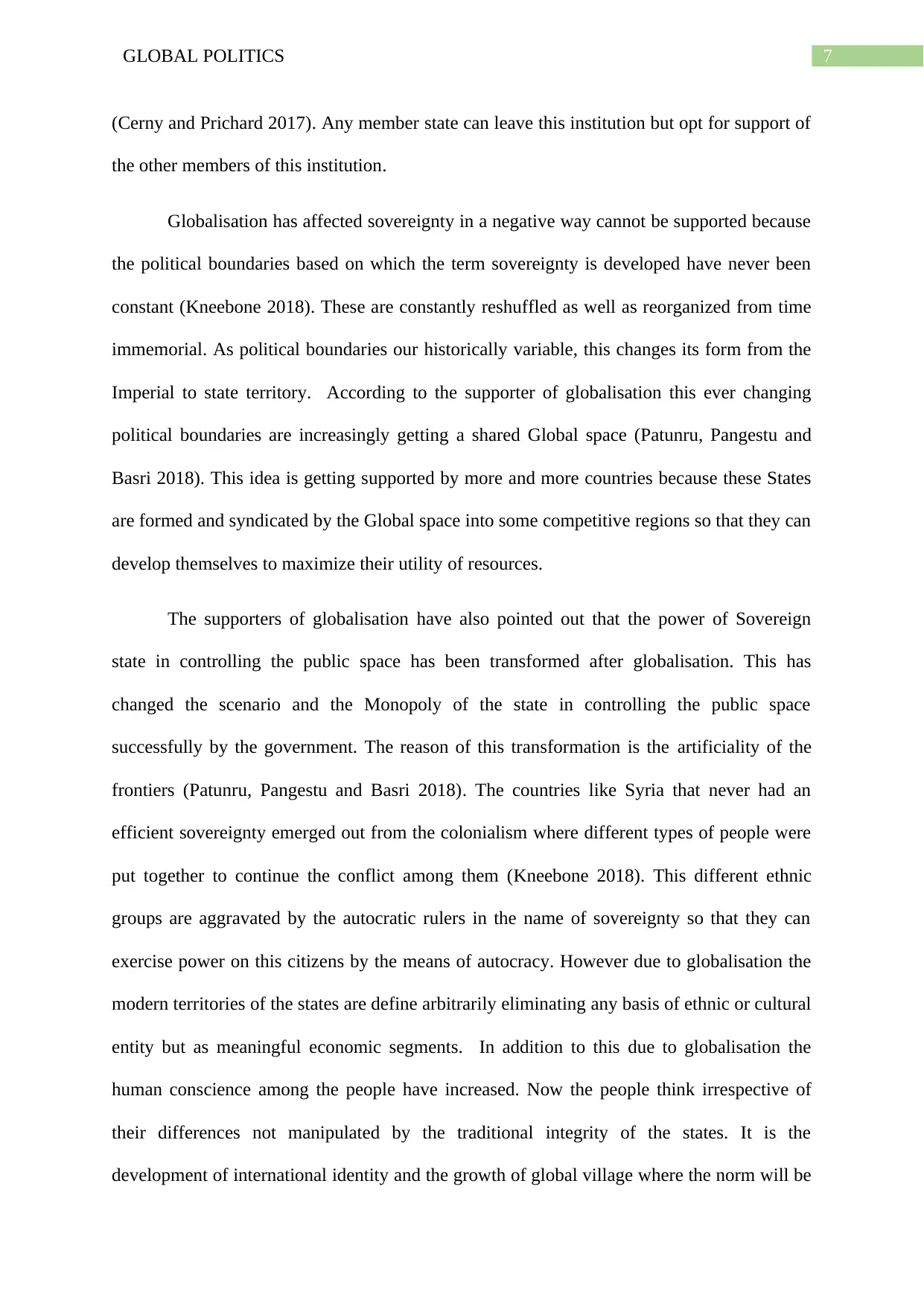
7GLOBAL POLITICS
(Cerny and Prichard 2017). Any member state can leave this institution but opt for support of
the other members of this institution.
Globalisation has affected sovereignty in a negative way cannot be supported because
the political boundaries based on which the term sovereignty is developed have never been
constant (Kneebone 2018). These are constantly reshuffled as well as reorganized from time
immemorial. As political boundaries our historically variable, this changes its form from the
Imperial to state territory. According to the supporter of globalisation this ever changing
political boundaries are increasingly getting a shared Global space (Patunru, Pangestu and
Basri 2018). This idea is getting supported by more and more countries because these States
are formed and syndicated by the Global space into some competitive regions so that they can
develop themselves to maximize their utility of resources.
The supporters of globalisation have also pointed out that the power of Sovereign
state in controlling the public space has been transformed after globalisation. This has
changed the scenario and the Monopoly of the state in controlling the public space
successfully by the government. The reason of this transformation is the artificiality of the
frontiers (Patunru, Pangestu and Basri 2018). The countries like Syria that never had an
efficient sovereignty emerged out from the colonialism where different types of people were
put together to continue the conflict among them (Kneebone 2018). This different ethnic
groups are aggravated by the autocratic rulers in the name of sovereignty so that they can
exercise power on this citizens by the means of autocracy. However due to globalisation the
modern territories of the states are define arbitrarily eliminating any basis of ethnic or cultural
entity but as meaningful economic segments. In addition to this due to globalisation the
human conscience among the people have increased. Now the people think irrespective of
their differences not manipulated by the traditional integrity of the states. It is the
development of international identity and the growth of global village where the norm will be
(Cerny and Prichard 2017). Any member state can leave this institution but opt for support of
the other members of this institution.
Globalisation has affected sovereignty in a negative way cannot be supported because
the political boundaries based on which the term sovereignty is developed have never been
constant (Kneebone 2018). These are constantly reshuffled as well as reorganized from time
immemorial. As political boundaries our historically variable, this changes its form from the
Imperial to state territory. According to the supporter of globalisation this ever changing
political boundaries are increasingly getting a shared Global space (Patunru, Pangestu and
Basri 2018). This idea is getting supported by more and more countries because these States
are formed and syndicated by the Global space into some competitive regions so that they can
develop themselves to maximize their utility of resources.
The supporters of globalisation have also pointed out that the power of Sovereign
state in controlling the public space has been transformed after globalisation. This has
changed the scenario and the Monopoly of the state in controlling the public space
successfully by the government. The reason of this transformation is the artificiality of the
frontiers (Patunru, Pangestu and Basri 2018). The countries like Syria that never had an
efficient sovereignty emerged out from the colonialism where different types of people were
put together to continue the conflict among them (Kneebone 2018). This different ethnic
groups are aggravated by the autocratic rulers in the name of sovereignty so that they can
exercise power on this citizens by the means of autocracy. However due to globalisation the
modern territories of the states are define arbitrarily eliminating any basis of ethnic or cultural
entity but as meaningful economic segments. In addition to this due to globalisation the
human conscience among the people have increased. Now the people think irrespective of
their differences not manipulated by the traditional integrity of the states. It is the
development of international identity and the growth of global village where the norm will be
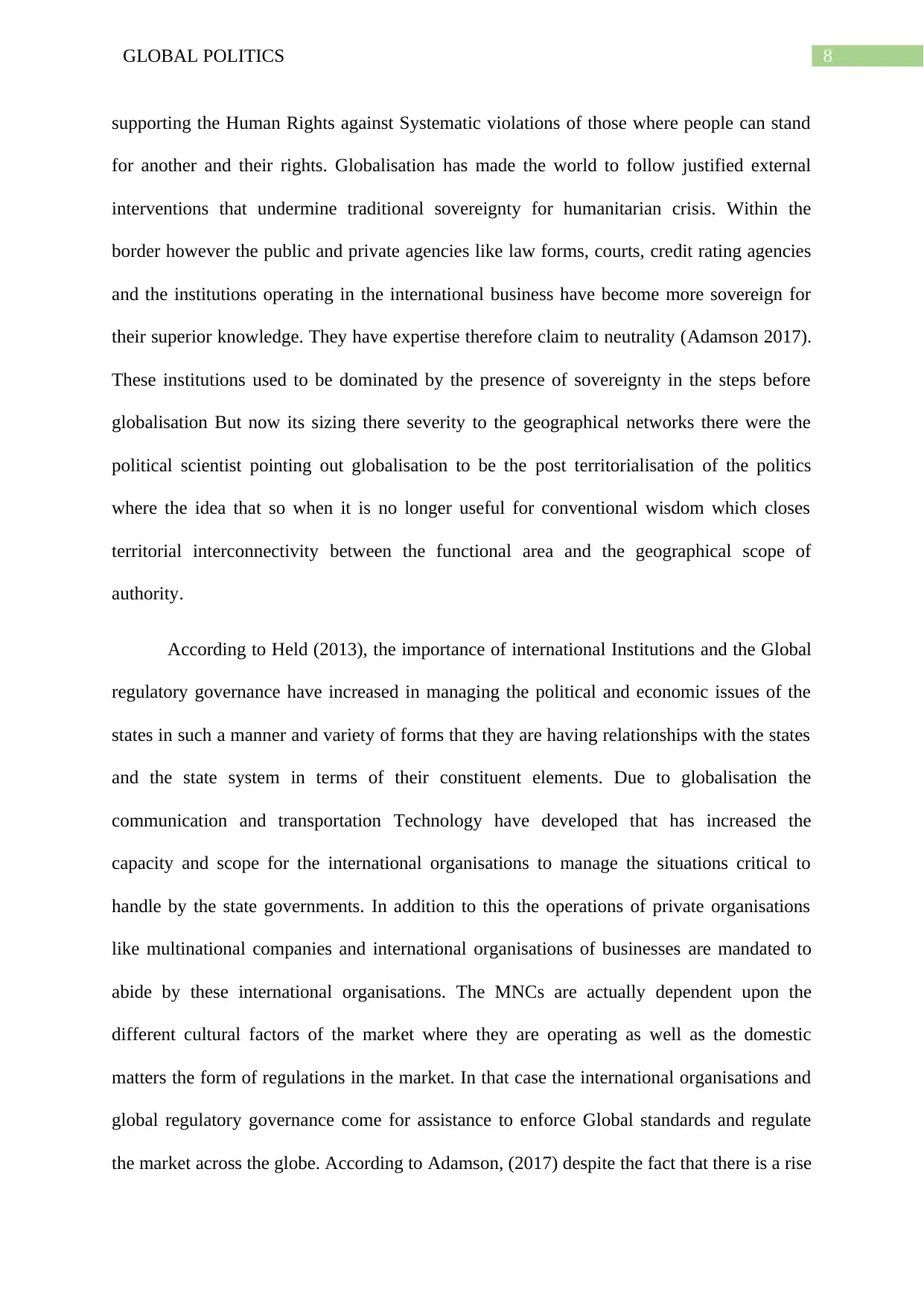
8GLOBAL POLITICS
supporting the Human Rights against Systematic violations of those where people can stand
for another and their rights. Globalisation has made the world to follow justified external
interventions that undermine traditional sovereignty for humanitarian crisis. Within the
border however the public and private agencies like law forms, courts, credit rating agencies
and the institutions operating in the international business have become more sovereign for
their superior knowledge. They have expertise therefore claim to neutrality (Adamson 2017).
These institutions used to be dominated by the presence of sovereignty in the steps before
globalisation But now its sizing there severity to the geographical networks there were the
political scientist pointing out globalisation to be the post territorialisation of the politics
where the idea that so when it is no longer useful for conventional wisdom which closes
territorial interconnectivity between the functional area and the geographical scope of
authority.
According to Held (2013), the importance of international Institutions and the Global
regulatory governance have increased in managing the political and economic issues of the
states in such a manner and variety of forms that they are having relationships with the states
and the state system in terms of their constituent elements. Due to globalisation the
communication and transportation Technology have developed that has increased the
capacity and scope for the international organisations to manage the situations critical to
handle by the state governments. In addition to this the operations of private organisations
like multinational companies and international organisations of businesses are mandated to
abide by these international organisations. The MNCs are actually dependent upon the
different cultural factors of the market where they are operating as well as the domestic
matters the form of regulations in the market. In that case the international organisations and
global regulatory governance come for assistance to enforce Global standards and regulate
the market across the globe. According to Adamson, (2017) despite the fact that there is a rise
supporting the Human Rights against Systematic violations of those where people can stand
for another and their rights. Globalisation has made the world to follow justified external
interventions that undermine traditional sovereignty for humanitarian crisis. Within the
border however the public and private agencies like law forms, courts, credit rating agencies
and the institutions operating in the international business have become more sovereign for
their superior knowledge. They have expertise therefore claim to neutrality (Adamson 2017).
These institutions used to be dominated by the presence of sovereignty in the steps before
globalisation But now its sizing there severity to the geographical networks there were the
political scientist pointing out globalisation to be the post territorialisation of the politics
where the idea that so when it is no longer useful for conventional wisdom which closes
territorial interconnectivity between the functional area and the geographical scope of
authority.
According to Held (2013), the importance of international Institutions and the Global
regulatory governance have increased in managing the political and economic issues of the
states in such a manner and variety of forms that they are having relationships with the states
and the state system in terms of their constituent elements. Due to globalisation the
communication and transportation Technology have developed that has increased the
capacity and scope for the international organisations to manage the situations critical to
handle by the state governments. In addition to this the operations of private organisations
like multinational companies and international organisations of businesses are mandated to
abide by these international organisations. The MNCs are actually dependent upon the
different cultural factors of the market where they are operating as well as the domestic
matters the form of regulations in the market. In that case the international organisations and
global regulatory governance come for assistance to enforce Global standards and regulate
the market across the globe. According to Adamson, (2017) despite the fact that there is a rise
⊘ This is a preview!⊘
Do you want full access?
Subscribe today to unlock all pages.

Trusted by 1+ million students worldwide
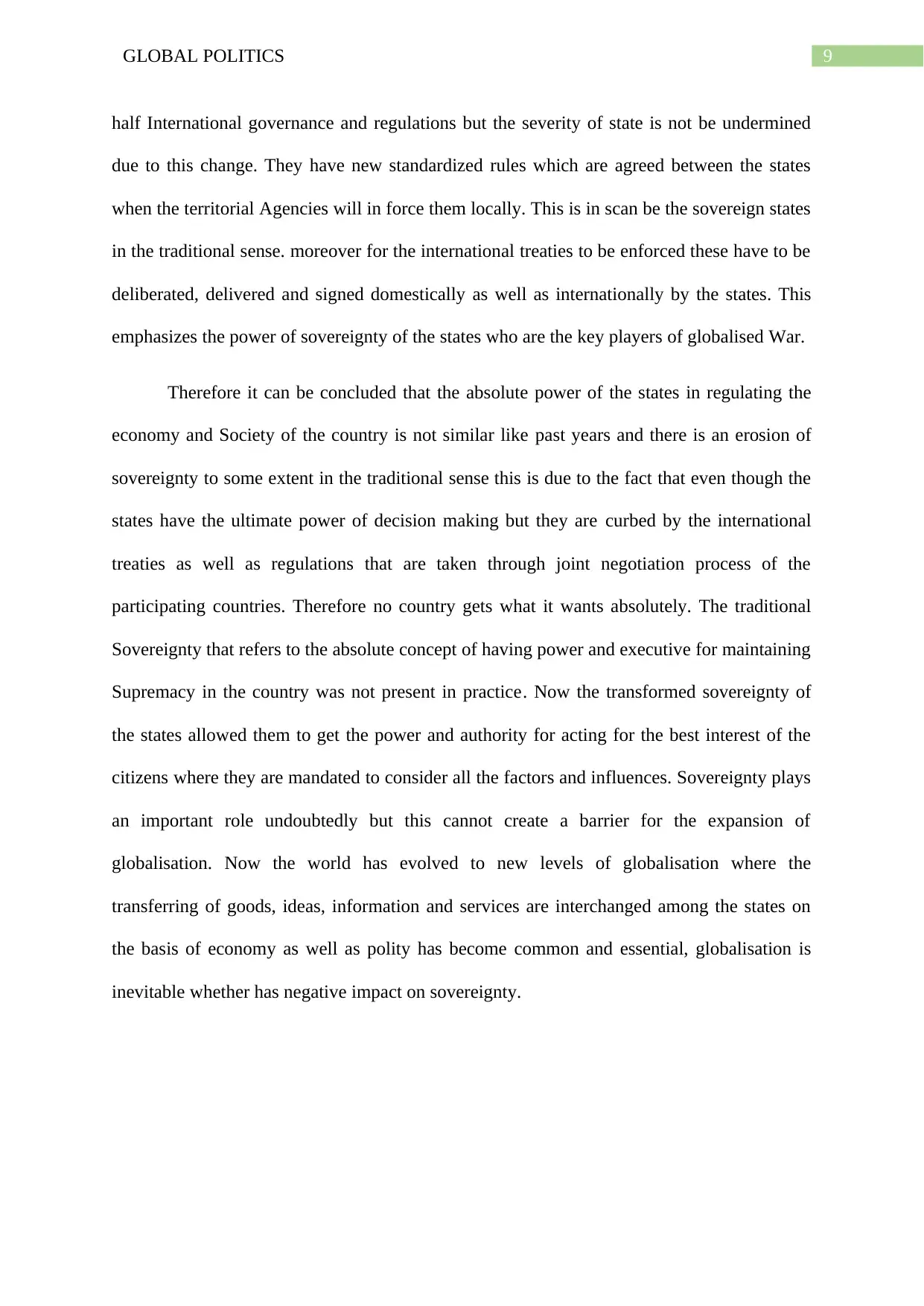
9GLOBAL POLITICS
half International governance and regulations but the severity of state is not be undermined
due to this change. They have new standardized rules which are agreed between the states
when the territorial Agencies will in force them locally. This is in scan be the sovereign states
in the traditional sense. moreover for the international treaties to be enforced these have to be
deliberated, delivered and signed domestically as well as internationally by the states. This
emphasizes the power of sovereignty of the states who are the key players of globalised War.
Therefore it can be concluded that the absolute power of the states in regulating the
economy and Society of the country is not similar like past years and there is an erosion of
sovereignty to some extent in the traditional sense this is due to the fact that even though the
states have the ultimate power of decision making but they are curbed by the international
treaties as well as regulations that are taken through joint negotiation process of the
participating countries. Therefore no country gets what it wants absolutely. The traditional
Sovereignty that refers to the absolute concept of having power and executive for maintaining
Supremacy in the country was not present in practice. Now the transformed sovereignty of
the states allowed them to get the power and authority for acting for the best interest of the
citizens where they are mandated to consider all the factors and influences. Sovereignty plays
an important role undoubtedly but this cannot create a barrier for the expansion of
globalisation. Now the world has evolved to new levels of globalisation where the
transferring of goods, ideas, information and services are interchanged among the states on
the basis of economy as well as polity has become common and essential, globalisation is
inevitable whether has negative impact on sovereignty.
half International governance and regulations but the severity of state is not be undermined
due to this change. They have new standardized rules which are agreed between the states
when the territorial Agencies will in force them locally. This is in scan be the sovereign states
in the traditional sense. moreover for the international treaties to be enforced these have to be
deliberated, delivered and signed domestically as well as internationally by the states. This
emphasizes the power of sovereignty of the states who are the key players of globalised War.
Therefore it can be concluded that the absolute power of the states in regulating the
economy and Society of the country is not similar like past years and there is an erosion of
sovereignty to some extent in the traditional sense this is due to the fact that even though the
states have the ultimate power of decision making but they are curbed by the international
treaties as well as regulations that are taken through joint negotiation process of the
participating countries. Therefore no country gets what it wants absolutely. The traditional
Sovereignty that refers to the absolute concept of having power and executive for maintaining
Supremacy in the country was not present in practice. Now the transformed sovereignty of
the states allowed them to get the power and authority for acting for the best interest of the
citizens where they are mandated to consider all the factors and influences. Sovereignty plays
an important role undoubtedly but this cannot create a barrier for the expansion of
globalisation. Now the world has evolved to new levels of globalisation where the
transferring of goods, ideas, information and services are interchanged among the states on
the basis of economy as well as polity has become common and essential, globalisation is
inevitable whether has negative impact on sovereignty.
Paraphrase This Document
Need a fresh take? Get an instant paraphrase of this document with our AI Paraphraser

10GLOBAL POLITICS
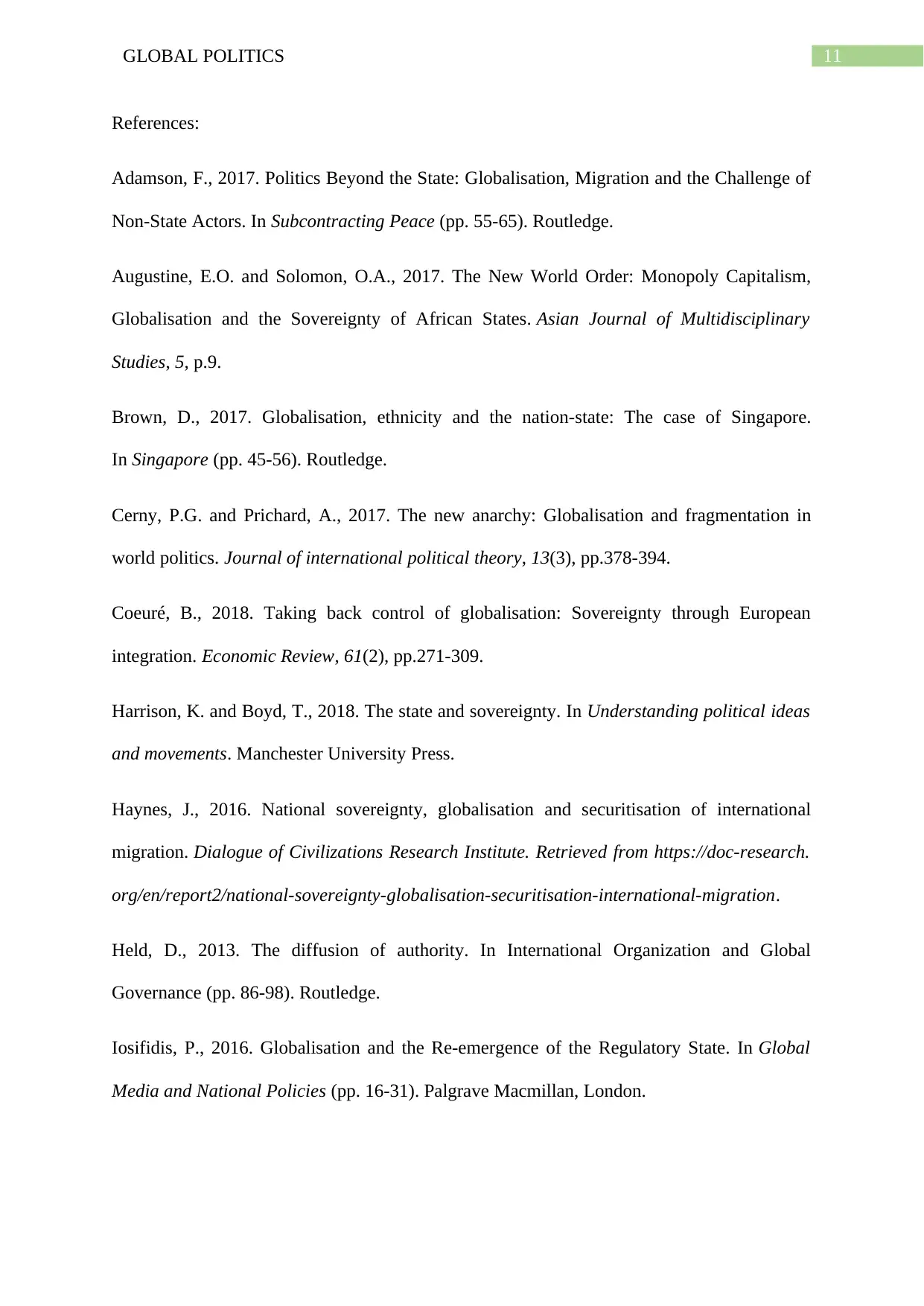
11GLOBAL POLITICS
References:
Adamson, F., 2017. Politics Beyond the State: Globalisation, Migration and the Challenge of
Non-State Actors. In Subcontracting Peace (pp. 55-65). Routledge.
Augustine, E.O. and Solomon, O.A., 2017. The New World Order: Monopoly Capitalism,
Globalisation and the Sovereignty of African States. Asian Journal of Multidisciplinary
Studies, 5, p.9.
Brown, D., 2017. Globalisation, ethnicity and the nation-state: The case of Singapore.
In Singapore (pp. 45-56). Routledge.
Cerny, P.G. and Prichard, A., 2017. The new anarchy: Globalisation and fragmentation in
world politics. Journal of international political theory, 13(3), pp.378-394.
Coeuré, B., 2018. Taking back control of globalisation: Sovereignty through European
integration. Economic Review, 61(2), pp.271-309.
Harrison, K. and Boyd, T., 2018. The state and sovereignty. In Understanding political ideas
and movements. Manchester University Press.
Haynes, J., 2016. National sovereignty, globalisation and securitisation of international
migration. Dialogue of Civilizations Research Institute. Retrieved from https://doc-research.
org/en/report2/national-sovereignty-globalisation-securitisation-international-migration.
Held, D., 2013. The diffusion of authority. In International Organization and Global
Governance (pp. 86-98). Routledge.
Iosifidis, P., 2016. Globalisation and the Re-emergence of the Regulatory State. In Global
Media and National Policies (pp. 16-31). Palgrave Macmillan, London.
References:
Adamson, F., 2017. Politics Beyond the State: Globalisation, Migration and the Challenge of
Non-State Actors. In Subcontracting Peace (pp. 55-65). Routledge.
Augustine, E.O. and Solomon, O.A., 2017. The New World Order: Monopoly Capitalism,
Globalisation and the Sovereignty of African States. Asian Journal of Multidisciplinary
Studies, 5, p.9.
Brown, D., 2017. Globalisation, ethnicity and the nation-state: The case of Singapore.
In Singapore (pp. 45-56). Routledge.
Cerny, P.G. and Prichard, A., 2017. The new anarchy: Globalisation and fragmentation in
world politics. Journal of international political theory, 13(3), pp.378-394.
Coeuré, B., 2018. Taking back control of globalisation: Sovereignty through European
integration. Economic Review, 61(2), pp.271-309.
Harrison, K. and Boyd, T., 2018. The state and sovereignty. In Understanding political ideas
and movements. Manchester University Press.
Haynes, J., 2016. National sovereignty, globalisation and securitisation of international
migration. Dialogue of Civilizations Research Institute. Retrieved from https://doc-research.
org/en/report2/national-sovereignty-globalisation-securitisation-international-migration.
Held, D., 2013. The diffusion of authority. In International Organization and Global
Governance (pp. 86-98). Routledge.
Iosifidis, P., 2016. Globalisation and the Re-emergence of the Regulatory State. In Global
Media and National Policies (pp. 16-31). Palgrave Macmillan, London.
⊘ This is a preview!⊘
Do you want full access?
Subscribe today to unlock all pages.

Trusted by 1+ million students worldwide
1 out of 13
Related Documents
Your All-in-One AI-Powered Toolkit for Academic Success.
+13062052269
info@desklib.com
Available 24*7 on WhatsApp / Email
![[object Object]](/_next/static/media/star-bottom.7253800d.svg)
Unlock your academic potential
Copyright © 2020–2026 A2Z Services. All Rights Reserved. Developed and managed by ZUCOL.





